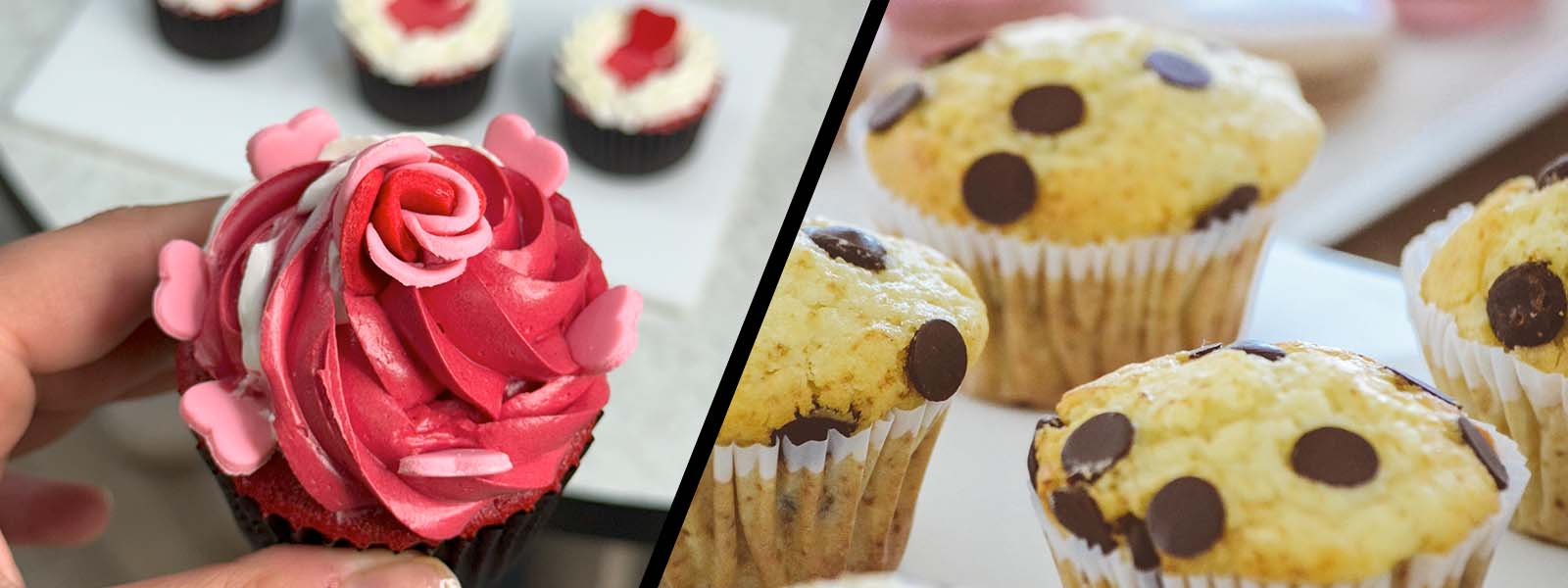

Next time you're baking, will it be a cupcake or a muffin? This question might sound simple, but it confuses new and even seasoned bakers. After all, at a glance, muffins and cupcakes often look similar: both are shaped by the same tin, both can be sweet, and both can charm a crowd. But are they just two sides of the same doughy coin—or are their differences more significant than most people realize?
If you’ve ever struggled to explain the difference between a muffin and a cupcake or wondered if your favorite breakfast treat is a cake in disguise, this comprehensive guide is for you. Let’s break it down, bust the myths, and give you the inside scoop—so your next bake brings exactly the results you want.
Pro Tip: Want to finally master the difference between cupcakes and muffins? Enrol in a Bakery and Pastry Course to get hands-on baking experience from pastry experts.
Picture this: You’re at a party. On one platter are beautifully frosted, colorful cupcakes. On another, golden-brown muffins studded with berries or nuts. They share the same recognisable dome, the same paper wrapper... so, are they so different?
Many home bakers, especially those just starting, have asked:
Understanding the difference between cupcakes and muffins isn’t just about baking the right treat—it’s about mastering baking science itself. Knowing the “why” and “how” behind these pastries can transform your skills, improve your results, and just maybe inspire you to create a brand-new favorite.
Let’s start with a classic: the cupcake.
The term cupcake first appeared in 19th-century American cookbooks. The name actually has a double meaning:
Cupcakes are, simply put, miniature cakes—single-serving, soft, and sweet, topped with swirls of creamy frosting and festive sprinkles.
A classic cupcake recipe features:
More sugar than muffins
Baking ratios are crucial: higher fat and sugar create a finer crumb, and the creaming method aerates the batter.
Cupcakes shine at:
Now, let’s dive into the world of the muffin.
Muffins are an old-world invention, dating to England in the 18th-century and popularized in American breakfast culture. They were designed as a portable, filling snack, appropriate for breakfast or an afternoon boost.
A typical muffin contains:
Muffin and cupcake difference often begins with the approach: muffin batters are just barely mixed—never overworked—to avoid creating a tough texture.
Muffins can be made “healthier” with:
Let’s see the most important differences in a quick table:
| Feature | Cupcake | Muffin |
| Sugar Content | High | Moderate to low |
| Fat Type | Usually butter | Usually oil |
| Texture | Light, tender, airy | Dense, moist, often heartier |
| Frosting | Always | Never |
| Occasions | Celebratory—desserts, parties | Every day—breakfast, snacks, lunchboxes |
| Sweetness | Dessert-level; very sweet | Balanced, subtle, sometimes savory |
| Mixing Method | Often plain or with sweet filling | Commonly has fruit, nuts, or grains |
| Appearance | Flat or gently domed, always frosted | Domed, rustic, no frosting |
Cupcakes vs Muffins: The great baking debate is as much about texture and taste as it is about the technique.
Why does it matter?
Technique is everything. Cupcakes rely on careful aeration for their delicate crumb; muffins want minimal gluten, letting fruit or nuts shine while retaining heartiness.
Pro Tip: Muffins are not just ‘less sweet cupcakes’—learn the science of baking both at cooking classes in Delhi tailored for home bakers.
Ever wondered if your favorite muffin can become a cupcake—or vice versa?
Pro tip: Not all recipes convert well. True, a cupcake cupcake (cupcake recipe, cupcake shape) needs sweetness and lightness; a muffin cake recipe focuses more on hearty, everyday appeal.
Nutrition is often a big concern, especially for parents or those watching their diets.
Muffin and cupcake difference: Neither is automatically “healthier”—it all comes down to your recipe.
Red Velvet: Rich cocoa and a hint of tang, always topped with cream cheese frosting.
Want to try blueberry cupcakes for your next party or chocolate muffins for a healthy snack? Experiment to discover your favorites!
So, what’s the final verdict in the cupcakes vs muffins debate?
Each has its place in the home baker’s kitchen. The key is knowing your purpose—then picking the right recipe for the moment.
If you’re after joy, fun, and color—go for cupcakes. If you want comfort, nutrition, and fuel—whip up a tray of muffins.
Of course, nothing is stopping you from experimenting: bake, taste, tweak, and find your family’s staples!
Q: Can I frost a muffin like a cupcake?
Yes, but it becomes more of a “dessert muffin”—technically, it’s a cupcake if you add traditional buttercream. Muffins are usually glaze- or crumb-topped, not frosted.
Q: Why are my cupcakes dense like muffins?
Likely causes: Not enough aeration (cream butter and sugar well!), or overmixing. Use cake flour and proper creaming for the best results.
Q: Can I use the same pan for both?
Absolutely! Muffin tins and cupcake tins are identical. It’s the batter, not the pan, that makes the difference.
Q: Are muffins always healthier than cupcakes?
No, baked muffins can be as high in sugar and fat as cake. However, homemade versions with fruit or whole grains tend to be healthier.
Q: What’s the difference between a muffin and a fairy cake?
Fairy cakes (a British classic) are smaller, less rich versions of cupcakes, often with a thin glaze instead of frosting.
Want to Bake? Try This Classic Blueberry Muffin Cake Recipe!
Ingredients:
Instructions:
Cupcakes vs Muffins, now you know the real differences, from mixing to flavor to occasion! For more expert baking advice, creative recipes, and culinary wisdom, keep following Tedco Education.
Do you prefer a rich, frosted cupcake or a wholesome blueberry muffin? Share your favorite and tag us in your next bake!

Culinary Instructor
Click one of our representatives below to chat on WhatsApp or send us an email to
info@tedcoeducation.com
Counselor
Bakery and Pastry Courses
Counselor
Culinary Arts Courses
Click one of our representatives below to chat on WhatsApp or send us an email to
info@tedcoeducation.com
Counselor
Bakery and Pastry Courses
Counselor
Culinary Arts Courses